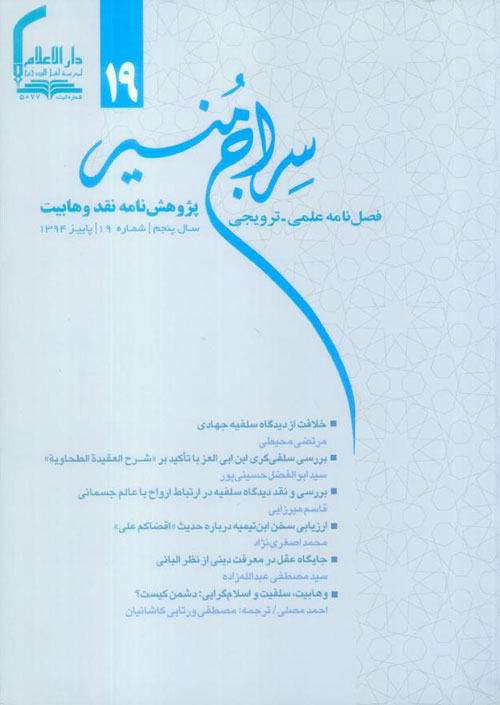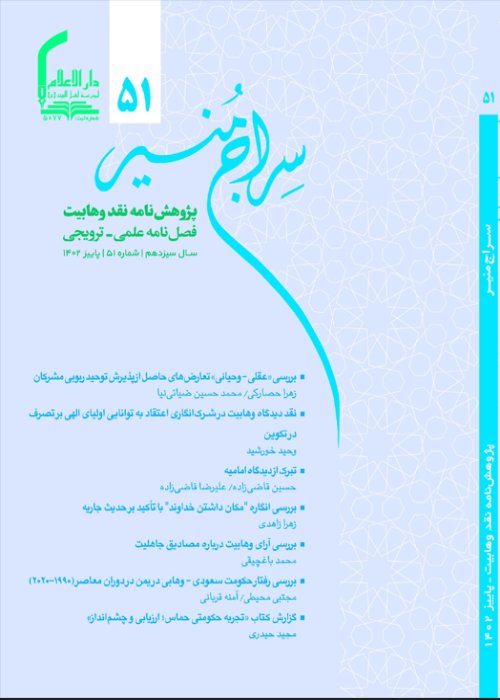فهرست مطالب

نشریه سراج منیر
سال پنجم شماره 19 (پاییز 1394)
- 200 صفحه، بهای روی جلد: 70,000ريال
- تاریخ انتشار: 1394/08/12
- تعداد عناوین: 9
- سرمقاله
-
صفحه 7
- گفت و گو
-
داعش؛ ثمره وهابیت / در مصاحبه با شیخ احمد الزینصفحه 11
- مقالات
-
صفحه 21
جریان سلفیه جهادی، گرایشی افراطی از سلفیه است که در نیم قرن گذشته با برداشت های تند از برخی افکار سید قطب ظهور کرده و مبنای فکری گروه هایی مانند القاعده، داعش و... قرار گرفته است. گروه های سلفیه جهادی با فهم ناقصی از حقیقت اسلام و با شعار بازگشت به عزت اولیه مسلمانان و مبارزه با سیطره فرهنگ غرب بر جوامع اسلامی، در پی احیای خلافت اسلامی هستند تا به گمان خود حاکمیت و عبودیت خداوند و عدالت اجتماعی در جوامع بشری را محقق کنند. آنان با اجتهادگرایی افراطی، حکومت های موجود را حکومت جاهلی می دانند و حاکمان و مردمی را که راضی به حکومت آنها هستند تکفیر می کنند. سپس برای نجات مردم از بردگی حکومت ها پیروان خود را به هجرت ترغیب می کنند تا پس از تمرکز و قدرت یافتن، به جهاد با مخالفان خود برخیزند و خلافت اسلامی را برپا کنند.
کلیدواژگان: سلفیه جهادی، سیدقطب، خلافت، تکفیر، جهاد، حاکمیت و عبودیت -
صفحه 39
شرح العقیده الطحاویه ابن ابی العز حنفی بی آنکه نامی از ابن تیمیه ببرد، تفکرات ابن تیمیه را انعکاس داده است. این کتاب سبب گسترش تفکرات سلفی در بین برخی مذاهب اسلامی شده است. در این مقاله، ضمن اثبات رابطه ابن ابی العز با ابن تیمیه، شاخصه های سلفی گری وی را بررسی کرده ایم. این شاخصه ها، که همان شاخصه های فکری ابن تیمیه است، در سه بخش تضییق مفهوم سلف، توسعه مفهوم عبادت و تغییر مفهوم اجتهاد است. هر یک از این شاخصه ها مناقشات جدی دارد. این شاخصه ها نه تنها از دید آیات و روایات مردود است، بلکه حتی با برخی از مبانی سلفی ها نیز در تعارض است.
کلیدواژگان: شرح العقیده الطحاویه، ابن ابی العز، سلفی گری، عبادت، تقلید -
صفحه 57
وهابی ها معتقدند با مرگ، ارتباط انسان با عالم دنیا پایان می یابد. لذا با مستمسک قراردادن برخی آیات و روایات به ناشنوایی اموات حکم کرده اند. از جمله دلایل وهابیت در نفی سماع موتی (ناشنوایی اموات) آیه إنک لا تسمع الموتی است. آنان بی توجه به مفهوم، با استناد به ظاهر این آیه، حکم به عدم سماع موتی داده اند. از دیگر دلایل آنان حدیث قلیب بدر است. هرچند این حدیث در اثبات نظریه سماع موتی مشهور است، با این حال وهابیت در دو محور از این حدیث بهره جسته اند تا در نفی سماع موتی استفاده کنند؛ محور نخست، نقل حدیث قلیب به روایت عایشه است که متضمن ناشنوایی اموات است؛ و محور دوم، واکنش عمر به کلام پیامبر است که از توانمندی شنیدن مردگان متعجب شده بود. نوشته حاضر، ادعای وهابیت را نقد می کند و می گوید مدعای ایشان در فهم آیه مخالف سیاق و نظر مشهور مفسران است. همچنین، استدلال به حدیث قلیب بدر در هر دو محور مذکور، مخالف ظاهر روایت واردشده است. بنابراین، ادله آنها مبنی بر نفی سماع اموات باطل است.
کلیدواژگان: وهابیت، سلفی ها، سماع مخوتی، قلیب بدر، انک لا تسمع الموتی -
صفحه 81
روایت نبوی «اقضاکم علی»، دست کم در نگاه عده ای از سلفی ها، مثل ابن تیمیه، سندا محل اشکال است. این عده درباره متن آن نیز نکاتی گفته اند؛ از جمله معتقدند به فرض استناد به این حدیث، چون دایره قضاوت از علم به حلال و حرام تنگ تر است، علی حتی بر معاذ هم تفوق ندارد، چه رسد به بالاتر از او. در مقاله ثابت می شود که مضمون این روایت با برخی آیات و بسیاری از روایات، تایید شده و از این طریق، ضعف سندی آن جبران و بلکه این روایت به عنوان روایتی که مضمون آن متواتر است، مطرح می شود. اشکال امثال ابن تیمیه در خصوص متن و محتوا نیز پاسخ داده شده است.
کلیدواژگان: حضرت علی (ع)، روایت اقضاکم، قضاوت، ابن تیمیه -
صفحه 103
تاکید قرآن و سنت بر نقش عقل در هدایت انسان، نشان از اهمیت این موهبت الهی دارد. از آنجایی که بحث حجیت عقل یکی از بحث های مهم در بین متکلمان و سلفی ها است و از سوی دیگر البانی، به عنوان یکی از رهبران سلفی، دارای پیروان و مکتبی است، بر آن شدیم تا عقل از دیدگاه البانی را بررسی و تبیین کنیم و ضعف های دیدگاه وی را نشان دهیم. با تحقیقات انجام شده این نتیجه به دست می آید که البانی تعریف خاصی برای عقل مطرح نکرده و معتقد است عقل بر دو قسم است: عقل حقیقی و عقل مجازی. به نظر وی، روایات عقل جعلی و موضوعه است. چون در سند بیشتر روایات عقل، داوود بن محبر وجود دارد. در نگاه البانی، خدا به وسیله عقل شناخته نمی شود و عقل سلیم با نقل صحیح تعارضی ندارد. حسن و قبح، شرعی است نه عقلی.
کلیدواژگان: عقل، البانی، روایات عقل، تعارض عقل و نقل، حسن و قبح عقلی -
صفحه 131
این مقاله به تحلیل سه جریان مخالف و متفاوت در تفکر مدرن اسلامی می پردازد که به اشتباه با هم جمع شده و از آن با عناوین «اسلام گرایی»، «بنیادگرایی»، «سلف گرایی»، «نئوسلف گرایی»، «وهابیت»، «جهادگرایی»، «اسلام سیاسی»، «اسلام رادیکالسم» و... بحث می شود.
کلیدواژگان: وهابیت، سلفیت، اسلام گرایی، بنیادگرایی - گزارش ها
-
گزارش کتاب جذور داعش / سلسله گزارش هایی از آثار اهل سنت در نقد افکار وه ابیتصفحه 161
-
Page 21
The Salafist Jihadist movement, is an extremist Salafist ideology which emerged in the past half-century with an extremist understanding of some ideas of the intellectual Sayyid Qutb, and it became the basis for the emergence of groups like al-Qaeda, the Islamic State and so on. With its defective understanding of the real Islam, Salafist Jihadist movement intends to fight western culture's dominance in the Islamic countries by reviving traditional Islamic Caliphate and applying God's sovereignty and worship and bringing about social justice among human. Sticking firmly to Islamic jurisprudence, they denounce all existing governments as ignorant and they accuse the rulers and the people under their rule of heresy. Ergo, to save people from slavery, they encourage their followers to emigrate so that, after centralizing in one place and getting strong, they can fight with their enemy and set up an Islamic caliphate.
Keywords: Jihadist Salafis, Sayyid Qutb, the caliphate, Takfir, jihad, sovereignty, worship -
Page 39
Although Ibn Taymiyyah's name is not mentioned in the book "Sharh Aqidah al-Tahawiyyah" by Ibn Abī al-Izz, it is a reflection of his thoughts. The book has provoked a promotion of Salafi doctrine among some of Islamic sects. This paper argues that there is a connection between Ibn Abī al-Izz and Ibn Taymiyyah; moreover, it will examine Salafi indicators inside the book. These indicators, which lead to Ibn Taymiyyah's thoughts, include: narrowing the concept of "Predecessor" (Salaf), broadening the meaning of worship and changing the notion of Jihad. These indicators require a serious discussion. Not only are these indicators refuted by the Qur’an and narration but they also are against some Salafi fundamentals.
Keywords: Sharh Al-Aqidah al-Tahawiyyah, Ibn Abī al-Izz, Salafism, worship, imitation -
Page 57
Wahhabis believe that death cuts off man’s connection with the physical world. Therefore, they deploy some Quranic verses and traditions to support their claim that the dead are incapability of hearing. The verse ( So verily you cannot make the dead to hear) is among the reasons which Wahhabists cite to reject the dead's capability of hearing. They are oblivious to the concept of the verse and they rely on its literal meaning to prove their claim that the dead are incapable of hearing. Another argument they offer to substantiate their claim is the Hadith of Ghulaib Badr. Although this Hadith is typically known to support the fact that the dead are capable of hearing, to prove that the dead are not capable of hearing, Wahhabis manage to manipulate the Hadith in two ways. First, the way Aisha narrated the Hadith suggesting that the dead are deaf. The second is Omar's reaction when he expresses his surprise upon hearing from the Prophet that the dead are capable of hearing. The purpose of the current study is to criticize this Wahhabi view, and to discuss that Wahhabis' understanding of this verse matches neither the context of the verse itself nor the dominant view of the exegetes of the Qur’an. In addition, the two above-mentioned arguments that Wahhabis put forward is totally against the explicit and literal meaning of the words of the Hadith. So, their arguments about the incapability of the dead to hear is invalid utterly rejected.
Keywords: Wahhabism, Salafi, hearing of the dead, Ghulaib Badr, So verily you cannot make the dead to hear -
Page 81
The authenticity (chain of narrators) of the narration from the Prophet, which says, "Ali is the most capable of you in judgment" has been questioned by some Sunnis, like Ibn Taymiyya. They have also mentioned some faults with the text of the Hadith. For instance, they believe that since the scope of judgment expands beyond mere knowledge of Halal and Haram, we cannot admit that Ali is superior to Ma'ath, let alone superior to men superior to Ma'ath, even if we suppose we can rely on the document of the Hadith. In this study, the researcher seeks to prove that there are some verses of Quran, along with some other narrations from the Prophet, which support and confirm the content of the narration; hence, this compensates for the narration's questionable authenticity (chain of narrators). Hereby this narration is considered successive (mutawatir) in terms of content. Many have provided answers to the faults that Ibn Taymiyya and others have found with the text and the content of the narration and they all indicate superiority of Ali over Ma'ath bin Jobail and the others.
Keywords: Ali, knowledge, judgment, Ibn Taymiyya -
Page 103
Considerable emphasis of the Qur'an and Sunnah on the role of reason in guiding people indicates the significance of this gift of God. Since there is a heated debate among theologians and the Salafis about authority of reason and Albania, on the other hand, is one of the Salafi leaders who has his own school and followers, we decided to investigate and explain reason from Albani's perspective and display the weaknesses of his view. Research shows that Albani has not proposed a specific definition for reason; he believes that reason is twofold: real reason and virtual reason. In his view, narrations are virtual reason because David Bin Mahbar is present there in the chain of the narrators of most of the narrations about reason. Albani believes that God cannot be known by reason and common sense is not supposed to conflict with reliable and authentic narrations. Thus, good and evil are originated in Shar'a not reason.
Keywords: wisdom, Albani, narrations about wisdom, conflict between, narration, rational goodness, badness -
Page 131
This essay constructs and deconstructs three main discourses created by different and opposing trends in modern Islamic thought that are normally and mistakenly lumped together as Islamism, fundamentalism, salafism, neo-salafism, Wahhabism, jihadism, political Islam, Islamic radicalism and others.
Keywords: Wahhabism, Salafism, Islamism, fundamentalism


